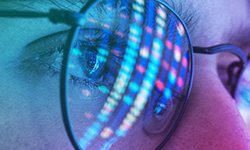Transformation of Business and Society
Fujitsu Technology and Service Vision 2022
Fujitsu Technology and Service Vision 2022 provides insight into how CEOs and other business leaders can achieve sustainability transformation through digital innovation.
On the Technology Vision page, we presented four visions on how evolving technologies will make the world more sustainable.
Here, we will share stories of organizations that are already pursuing these visions on their transformation journeys. Finally, we will introduce Fujitsu Uvance, our new business focusing on sustainability transformation.
We will explore the critical challenges that need to be addressed and how we aim to make the world more sustainable via 7 key focus areas: Sustainable Manufacturing, Consumer Experience, Healthy Living, Trusted Society, Digital Shifts, Business Applications and Hybrid IT.
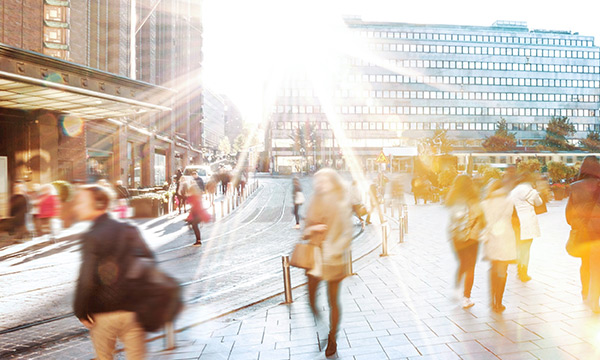
First step
How can you navigate your sustainability transformation journey towards a better future?
The world faces a wide range of challenges, from climate change, energy transformation, environmental conservation and biodiversity through to human rights, food safety, health, an aging population, urban problems and global supply chain resilience. Organizations need to prioritize which challenges they will address by considering their specific industry and business characteristics.

Borderless WorldBorderless way of working: Fujitsu's Work Life Shift
Hybrid working styles have become the new normal since the outbreak of COVID-19. Early in the pandemic, Fujitsu successfully moved our 130,000 global people to a remote working model, introducing Work Life Shift to empower them to choose how they wish to work.
Our motivation behind this significant shift is the well-being of our people. We aim to create an environment where diverse people can work with autonomy and mutual trust, free from constraints of fixed locations or rigid working hours. In this new working environment, we encourage our people to deliver value to customers and help transform society continuously.
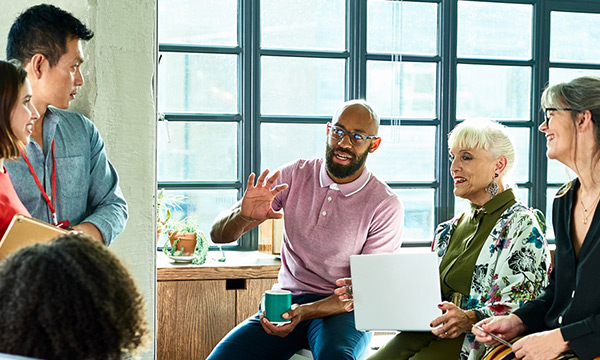
In the two years since this new working style was introduced, we have seen tangible improvements in both productivity and engagement. The challenge now is to further increase well-being and accelerate innovation. We believe this can be achieved by creating borderless synergies between the physical and digital working experiences, helping our people achieve the optimal balance between their work and private lives.
Fujitsu recently conducted a global joint survey into hybrid working, collaborating with HSM Advisory, the organization founded by Professor Lynda Gratton from the London Business School, a leading thinker in workstyle transformation. The survey confirmed that sharing a deep sense of purpose and developing a connected place for employees to nurture innovation in the remote workplace are essential for delivering sustainable high performance.
We will continue to evolve Work Life Shift by incorporating feedback from our people. We are also using this experience to drive our customers’ transformation.
Dynamic ResilienceSustainable cities: A shared mobility solution in Munich City
Cities around the world continue to expand. This is causing major societal challenges, from CO₂ emissions through to the economic cost of traffic congestion. Private and public sector organizations are implementing a range of initiatives in response, including shared micro-mobility services using bicycles and e-scooters. While these schemes are being implemented in many countries, they have their challenges. For example, how can you monitor usage status in real time, and how do you prevent people abandoning bicycles and e-scooters, obstructing traffic and pedestrians?
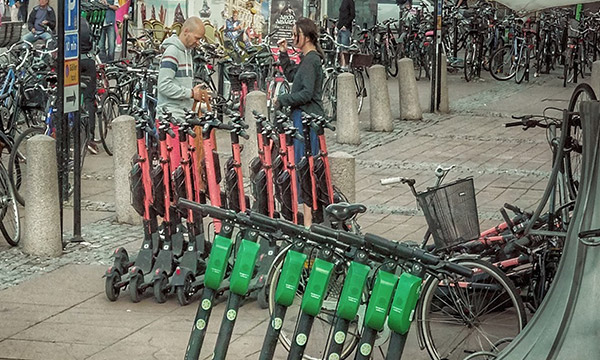
Hexagon and Fujitsu are collaborating on the development and implementation of a smart monitoring solution that collects data from bicycles, e-scooters, cars and various sensors in the city, enabling accurate, real-time monitoring of mobility conditions. The solution creates a digital twin using spatio-temporal information, comparing it with historical data to analyze patterns of usage time and locations. This is helping to improve services, including the installation of new e-scooter stations.
Transport planners in Munich have also taken up this challenge, with a pilot Proof of Concept project exploring the management of shared mobility. This project has now been completed. A SaaS solution has enabled the city to track, visualize and analyze IoT data from a variety of mobility providers, helping them monitor shared vehicles, such as e-scooters and bicycles. The planners were able to create a comprehensive picture of Munich through a dynamic digital twin of the city, a real-time digital representation of the physical world. This digital twin has allowed them to test new processes virtually before actual deployment.
Discovery RevolutionFuture of cancer treatment: Aichi Cancer Center adopts AI systems
The treatment of serious diseases is essential to improve individual quality of life and to reduce social healthcare costs. To contribute to advances in cancer treatment, Fujitsu has been working with various universities, research institutes and hospitals, using our innovative Explainable AI technology. We are conducting research and development to visualize the relationship between cancer, genetic variants and drug treatments to support medical professionals.
Since November 2019, Aichi Cancer Center and Fujitsu have been collaborating on the development of AI systems for use in clinical practice. Experimental data on the effects of therapeutic agents by cancer types and genomic information in external databases, which are sorted and managed based on different keywords and rules, remain difficult to use.

Combining the know-how of Aichi Cancer Center in drug selection and Fujitsu's AI technology, we have developed a new solution that can sort and combine these data under common keywords and a single data format and generate a structured data of knowledge, called Knowledge Graph.
This solution enables physicians to find the medications that are expected to be highly effective for each patient, contributing to a significant reduction in the time required to predict drug efficacy, as well as to search for data providing evidence for their estimations. It will help physicians to effectively and precisely select the medications with the best possible outcome based on patients’ genomic variants, resulting in the improved treatment efficacy and avoidance of unnecessary treatments.
Aichi Cancer Center and Fujitsu continue to work together to apply AI technology for precision cancer medicine.
Trust in EverythingSafe water for everyone: The world’s first blockchain-based water exchange platform
Around the world, more than two billion people live without access to clean water and sanitation. Yet, every year, we waste millions of gallons of water in the preparation of fruit and vegetables in food factories, with a huge impact on the environment.
Botanical Water Technologies (BWT) based in the UK has developed an innovative technology that can refine and recycle the water previously discarded by food processing operations. BWT selected Fujitsu as key technology partner, and jointly developed the world’s first blockchain-based water exchange platform (Botanical Water Exchange), to create a safe and secure marketplace for water and water impact credits trading.
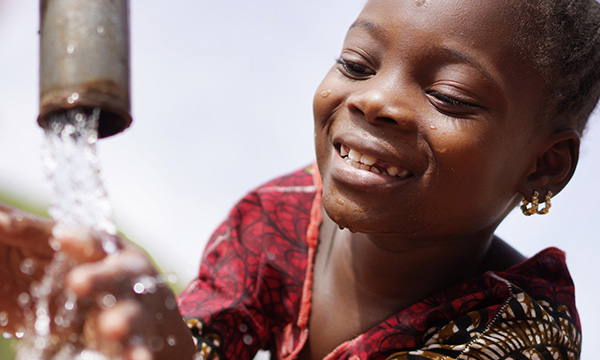
Juice and sugar mills, for example, can now accurately trace botanical water through each step of their production process, from refinement through to sales, delivery and usage. At the same time, botanical water can now be sold to other food and beverage manufacturers or recycled internally as a new source of reusable water.
Through this initiative, BWT and Fujitsu are promoting their vision of a circular economy, reducing waste and providing a significant new source of clean water.
To realize our purpose of making the world more sustainable by building trust in society through innovation, Fujitsu is working with our customers to address key cross-industry challenges. To drive this objective, we recently launched Fujitsu Uvance as our new business focus oriented for a better future.
Through Fujitsu Uvance, we are building new possibilities by connecting people, technology and ideas, creating a more sustainable world where anyone can advance their dreams. Using our advanced technologies, skills and knowledge of different industries, we will provide human-centric services, data-driven resilience and connected ecosystems to drive sustainable transformation.
In this section, we explore how Fujitsu Uvance is impacting key industry themes across sustainable manufacturing, consumer experience, healthy living and trusted society, and how this is enabled by digital shifts, business applications and hybrid IT.
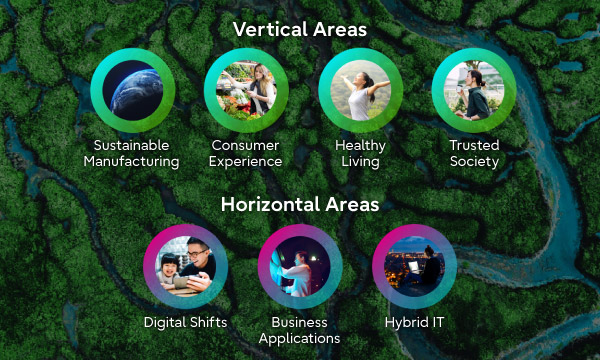
Sustainable Manufacturing
The world faces extreme uncertainties. From the COVID-19 pandemic through to the recent crisis in Ukraine, we see a level of disruption to the global economy and people’s lives that we have not experienced for decades. Global supply chains have been fractured, causing a worldwide shortage of semiconductors for example, while we are also experiencing soaring prices of natural resources. Globalization strategies, such as basing production in optimal locations to drive efficiency, are having to be fundamentally reviewed.

All stakeholders now expect organizations to take proactive action to address global challenges such as climate change, environmental pollution and destruction of natural ecosystems. In addition, organizations have an expanded responsibility not only to environmental sustainability but also to the dignity and well-being of their employees and all people throughout their global value chains. With an increasingly aging population in many countries, they also need to transfer the knowledge and skills of experienced workers to new generations.
What kind of medium to long-term strategies are required to address these challenges and realize a more sustainable future? By using data and digital technology, we believe organizations can strengthen resilience to uncertainties and transform business value to enable people and the planet to co-exist successfully.
Coexistence of people and the planet
Backed by 87 years of experience in manufacturing, Fujitsu is driving digital transformation across engineering, production and supply chains. Leveraging our experience and cutting-edge digital technologies, such as AI and digital twins, we are helping organizations to improve resilience and transform into truly sustainable businesses, ensuring people and the planet can co-exist successfully.
Carbon Neutrality
Monitoring and reducing CO₂ emissions We help organizations to formulate strategies and measures to achieve carbon neutrality by visualizing CO₂ emissions throughout entire supply chains.
People Enablement
Collaboration between humans and robots/AI We empower people from design and production to maintenance through process automation. We use digital technology to help resolve labor shortages and enable transfer of skills from experienced workers.
Value Chain Optimization
Creating a regenerative society We enable traceability throughout value chains to optimize supply and demand, promoting a circular economy that encourages the effective re-use of resources.
Enterprise Visualization
Visualizing processes to support decisions By visualizing the present and forecast status of business activities with financial and non-financial KPIs, we help agile, data-driven decision making in response to dynamic changes.
Resilient Supply Chain
Improving responsiveness to uncertainty We enable the autonomous reconfiguration of global supply chains in response to disruptive events by simulating and sensing potential risks.
Consumer Experience
How will consumption styles evolve over the next decade? Millennials and Generation Z are expected to account for nearly 70% of the working age population by 2030, also becoming the majority of consumers. These generational groups are highly aware of the need to protect the global environment, supportive of ethical business practices and keen to choose experiences that reflect their values, beyond material considerations like brand and price. To successfully engage with these groups, organizations need to demonstrate relevance, empathize and resonate.
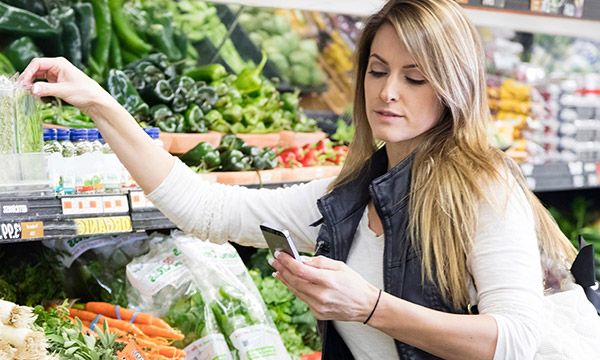
As lifestyles and individual values become more diverse, markets are becoming increasingly borderless. Online and offline experiences are merging. In many cases, the boundaries between consumers and organizations are blurring, with consumers actively participating in ongoing product and service development. Many business services such as retail, payment, financing and logistics are now provided ‘as a service’ through the cloud. These diverse services are then being connected through digital interfaces, seamlessly embedded into consumers’ everyday lives.
The successful exploitation of data and digital technology is key to enabling modern businesses to adapt to these more personalized and sustainable consumption styles.
Sustainable consumption
To help create a sustainable future, we need advanced retail as a service to enable more diverse and personalized purchasing experiences. We also need to build sustainable supply chains and new mechanisms for value exchange between individuals and organizations. Fujitsu is focused on enabling new consumption models that allow consumers to contribute more easily to environmental and social sustainability through their daily lives.
Smart Retail
Driving personalized value through physical and digital convergence Digital technology connects consumers and sellers in a borderless world, providing personalized services tailored to individual needs, optimizing consumer experience.
Smart Enterprise
Increasing agility with automation and data Employee experience and productivity can be improved by automating operations and reducing routine workloads. Market strategies can become more agile, using data to sense and predict changes both in consumer behavior and the extended value chain.
Smart Platform
Creating a new economy based on exchange of data and intangible value Using distributed trust technology, we are exploring new platforms capable of distributing various intangible values across countries and industries.
Smart Supply Chain
Encouraging sustainable consumption We are encouraging ethical consumption and reducing waste by enhancing traceability throughout global value chains.
Healthy Living
COVID-19 continues to pose a significant threat to people’s health, while increasing the burden on healthcare workers around the world. Accelerating the release of new vaccines and therapeutic drugs has become increasingly urgent. Without doubt, the crisis has highlighted the importance of resilience and speed of response at times of great uncertainty.
In addition, as many countries experience an aging population, maintaining people’s quality of life has become a major challenge. How can we help people live healthier lives, both physically and mentally, regardless of their age, gender, or location?

Data and digital technology can help people achieve the goal of healthy living. An important step is to bring together critical health data previously dispersed across hospitals, universities, research institutes, companies and governments. By enabling data-driven insights, this will help to support patient journeys more effectively, from prevention and prognosis through to the treatment of diseases. As well as improving patient journeys, the exploitation of digital technologies such as HPC and AI is also helping to accelerate the development of new drugs and new method of treatment.
Expanding individual potential
We are pursuing several initiatives to create a world where people can maximize their life experiences and realize their full potential.
Self-reliant
From treatment to prevention We help people to monitor and manage their health status remotely, preventing illness and reducing physical hospital visits. We enable personalized support by exploiting complex data analysis, including genome information.
Ignite
Free from constraints Augmented reality, virtual reality and robotic technology have the potential to expand people’s mind, body, physical senses through to the way they interact and connect. The technology helps people to maximize their potential, free from constraints such as age and disability.
Seamless
Healthcare embedded in everyday life We enable integrated, end-to-end healthcare journeys, from prevention through to treatment and prognosis, by developing digital ecosystems that connect healthcare and related service providers.
Enhance
Enabling more healthcare options We are exploring innovative approaches in healthcare, including drug discovery and development, by exploiting advanced computing, AI, data analytics and other emerging digital technologies. This is helping to increase the options available for both treatment and care plans.
Trusted Society
In many parts of the world, cities have become complex ecosystems in which infrastructure services such as energy, transport and local government have become closely linked. What can be done to reduce environmental impacts in these cities? How can we make them more resilient to uncertainty and develop inclusive public services that ensure that no one is left behind? How can we make these connected urban ecosystems more sustainable?
We have to build a sustainable society, ensuring that people are able to respond to change positively, and live safer, more fulfilled lives. Digital technology is key to visualizing the dynamics of these connected urban ecosystems, assessing potential risks and future scenarios by leveraging real-time data. Digital technology can also effectively connect people with services, involving them in the ongoing process of creating a more trusted society.

A prosperous and sustainable society
We are helping to create trusted services and urban resilience, by enabling human-centric public services, sustainable energy sources and transport with low environmental impact. Our aim is to realize a prosperous and sustainable society.
Human-centric Public Services
Inclusive public services with citizen participation We are pioneering the vision of new public services, based on involving citizens and encouraging collaboration between public and private sectors. We are also enabling personalized services that ensure no-one is digitally excluded.
Sustainable Energy Cycle
Decarbonized society by clean energy We are enabling the shift from a society based on fossil-based energy sources to a new regenerative society. We are doing this by connecting various energy sources, including renewable energy, with storage batteries and electric vehicles. We are also enabling a more resilient energy supply by using real-time data to forecast and orchestrate supply and demand.
Sustainable Transportation
Sustainable mobility for people and things We are helping to build inclusive mobility services available for all, while enabling resilient transport services with low environmental impact. We are using technology to address various related social challenges including air pollution, noise, congestion and accidents.
Digital Shifts
A new form of business
Successful sustainability transformation requires both the empowerment of people and the advanced exploitation of data. It also requires new, creative ways of working, where diverse communities of people can collaborate through hybrid working, free from the traditional constraints of place and time.
We also need to establish data-driven approaches that organically connect and analyze data from across their organization to detect signs of change, consider future scenarios and enable agile actions. At Fujitsu, we are now using our own transformation experience to support the digital shift of organizations.
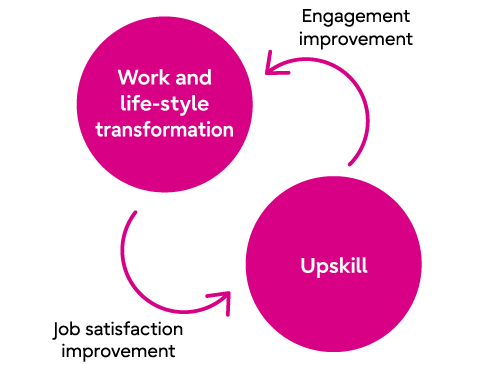
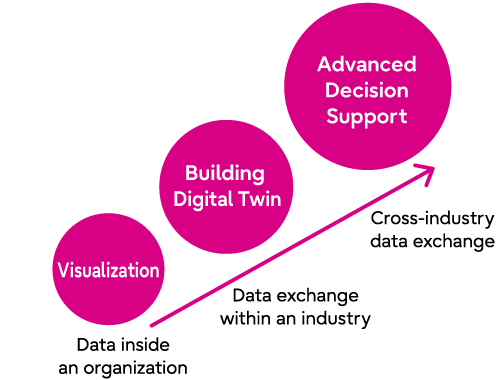
Business Applications
Enabling business agility
Organizations need to respond quickly to changing customer needs and markets as well as environmental and social conditions. In many cases, existing IT systems are unable to respond in a timely fashion. In addition, organizations are facing a shortage of the skills and talent to meet the growing need for agile development of digital applications. We believe that in the future businesses will shift from creating their own new cloud-native applications to quickly connecting and combining various services.
Fujitsu provides a wide range of business applications on a global basis, bringing together technologies from our ecosystem partners with our own deep industry knowledge and cutting-edge technologies. As a navigator supporting organizations with technology, we continue to develop applications and services that further enhance business agility.
- UseCombine and utilize global-standard services
- ConnectFlexibly integrate industry applications and functional applications through APIs
- CombineImprove agility by integrating composable applications that incorporate knowhow of specific industries and AI technology utilization.
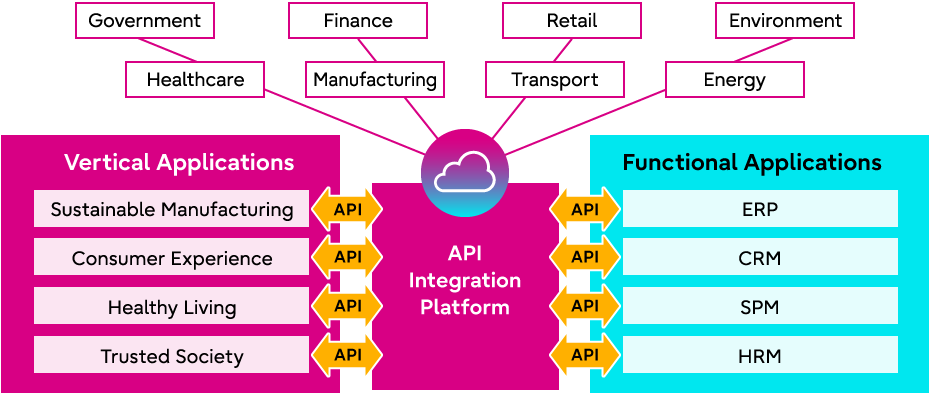
Hybrid IT
Connecting the physical and digital worlds safely and securely
How can IT infrastructure help to realize a more sustainable future? By enabling various organizations and research institutes to easily utilize the computing power of HPC and high-speed 5G networks, we can accelerate innovation to overcome our most difficult environmental and social challenges. We must also create the required processes to protect safety and data security across a borderless world, with the resilience needed to respond autonomously to risks and failures.
Fujitsu is advancing Hybrid IT from simple cloud migration through to the convergence of physical and digital environments and the realization of a human-centric, connected world. By providing a safe and secure technology platform, we are connecting people, data, things and services across physical and digital spaces, contributing to the creation of new value and helping to address social challenges.
- HPC cloud and Network and Edge as a ServiceProvide HPC and networks as an ‘easy to use anytime’ infrastructure service.
- SecuritySupport physical-digital convergence with next-generation security, enabling the borderless world.
- Resilient serviceReduce the business risk caused by system outages by introducing proactive AI-driven detection of failures, root cause analysis, impact analysis and decision support.
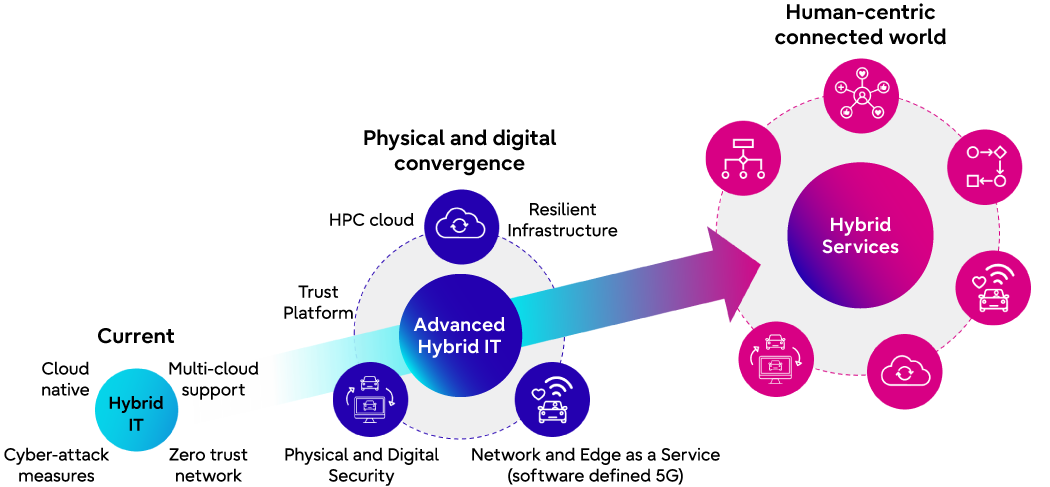
Business and social transformation through innovation
Fujitsu is deploying digital technology and services to drive sustainability transformation across multiple areas.
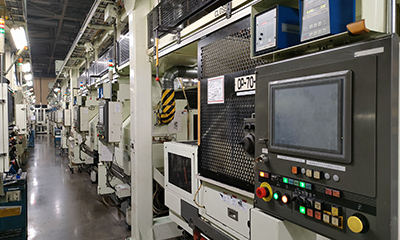
SUBARU
Gunma Factory’s Oizumi Plant is using an AI model to accurately determine the quality of grinding processes for the manufacture of camshafts, an engine component for valve control. Real-time inspection by AI is already reducing post-production problems.
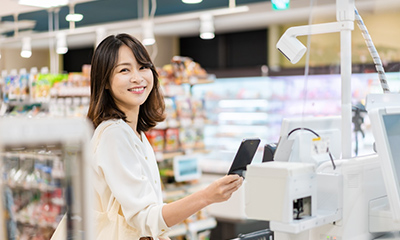
United Super Markets Holdings (U.S.M.H.)
U.S.M.H. offers "Scan & Go and Online Delivery", a smartphone app for a smart online and offline shopping experience. U.S.M.H. and Fujitsu jointly drive agile development to continuously enhance application functionalities and to strengthen consumer touch points.



